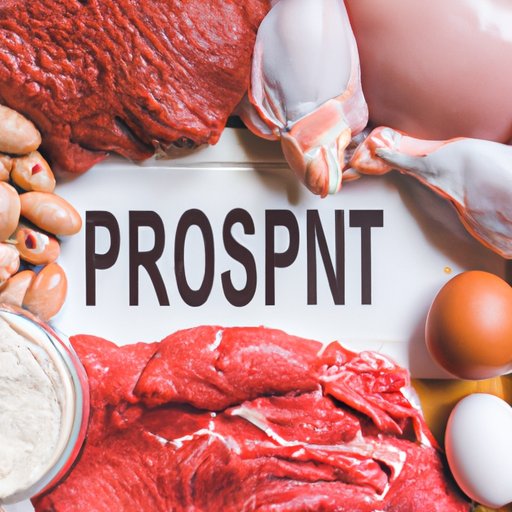
Introduction
Protein is an essential macronutrient that plays a vital role in building and repairing tissues and organs, supporting immune function, and producing enzymes and hormones in the body. However, it is possible to consume too much protein, which can lead to potential health risks. In this article, we will discuss the physical and metabolic effects of eating too much protein, the optimal amount of protein for a healthy diet, the risks of high-protein dieting, the relationship between protein and weight gain, and suggestions for achieving a balanced diet.
Physical and Metabolic Effects of Eating Too Much Protein
Consuming more protein than your body can handle may cause physical and metabolic effects. Some signs of consuming excess protein include dehydration, bad breath, and constipation. Overconsumption of protein can also lead to the accumulation of waste products, which can put stress on the kidneys and liver, compromising their function. Therefore, it is essential to balance your macronutrient intakes to avoid negative health effects.
Optimal Amount of Protein for a Healthy Diet
The recommended daily protein intake varies on factors such as age, gender, body weight, and physical activity level, but, in general, the daily intake should be around 0.8 grams of protein per kilogram of body weight. This amount can be adjusted based on a person’s needs, like highly active individuals who may need more protein. However, exceeding optimal protein intake levels may put a person at risk of developing health issues such as kidney damage, weight gain, and reduced bone density.
Risks of High-Protein Dieting
High-protein diets like the Ketogenic and Paleo diets have been popular in recent years due to their short-term benefits, aiding in weight loss and building muscle. However, the negative long-term effects of these diets might outweigh the short-term benefits. High-protein diets generally rely on protein-rich foods from animal sources such as meat, fish, and dairy, which are typically high in fat, leading to higher risks of heart disease, type 2 diabetes, and other chronic diseases.
Protein and Weight Gain
The amount of protein in a person’s diet can affect weight gain, but it doesn’t necessarily mean that a high-protein diet causes significant weight loss. Protein-rich foods such as red meat, chicken, pork, and dairy products are often high in calories. That means that increasing protein intake without adjusting total calorie intake can lead to weight gain.
Achieving Balance in Your Diet
Consuming a balanced diet that includes all essential macronutrients and micronutrients is crucial for good health. A healthy, balanced diet should include carbs, fats, and protein in appropriate portions, depending on a person’s dietary need. There are many ways to achieve this, such as incorporating plant-based protein sources such as tofu, legumes, whole grains, nuts, and seeds to your diet. Additionally as suggested earlier, professionals such as nutritionist or dietitian can help guide a healthy diet according to one’s specific needs or circumstances.
Conclusion
Consuming too much protein can lead to negative health effects, including kidney damage, weight gain, and reduced bone density. It’s essential to maintain the optimal levels of protein intake that fits individualized requirements. The benefits of a healthy and balanced diet can also be offset by extreme high-protein diets and missing on other necessary nutrients. Seek help from professionals to adjust diagnosis, circumstances, or goals accordingly for a healthy diet.




